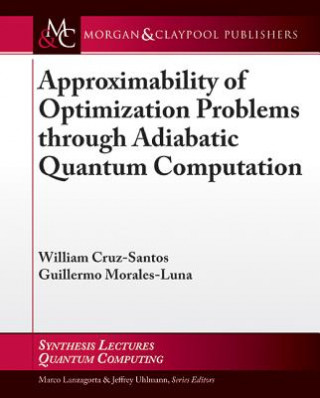
Kód: 09065664
Approximability of Optimization Problems through Adiabatic Quantum Computation
Autor Guillermo Morales-Luna
The adiabatic quantum computation (AQC) is based on the adiabatic theorem to approximate solutions of the Schrödinger equation. The design of an AQC algorithm involves the construction of a Hamiltonian that describes the behavior ... celý popis
- Jazyk:
 Angličtina
Angličtina - Vazba: Brožovaná
- Počet stran: 113
Nakladatelství: Morgan & Claypool Publishers, 2014
- Více informací o knize

Mohlo by se vám také líbit
-

Dune
216 Kč -

Haunting Adeline
621 Kč -

Berserk Deluxe Volume 2
1092 Kč -

White Nights
89 Kč -

Powerless
268 Kč -

Atomic Habits
330 Kč -

Dune Messiah
228 Kč -

Berserk Deluxe Volume 3
1142 Kč -

One Day
221 Kč -

Berserk Deluxe Volume 1
1115 Kč -

Iron Flame
368 Kč -

Surrounded by Idiots
213 Kč -

Harry Potter and the Prisoner of Azkaban (Minalima Edition)
993 Kč -

Gravity Falls Journal 3
443 Kč -

Heaven Official's Blessing: Tian Guan Ci Fu (Novel) Vol. 1
420 Kč -

The Creative Act
568 Kč -

Dune
276 Kč -

Hunting Adeline
624 Kč -

A Little Life
290 Kč -

Children of Dune
230 Kč -

Heaven Official's Blessing: Tian Guan Ci Fu (Novel) Vol. 2
427 Kč
Informovat o naskladnění knihy
Zadejte do formuláře e-mailovou adresu a jakmile knihu naskladníme, zašleme vám o tom zprávu. Pohlídáme vše za vás.
Více informací o knize Approximability of Optimization Problems through Adiabatic Quantum Computation
 Anotace knihy
Anotace knihy
The adiabatic quantum computation (AQC) is based on the adiabatic theorem to approximate solutions of the Schrödinger equation. The design of an AQC algorithm involves the construction of a Hamiltonian that describes the behavior of the quantum system. This Hamiltonian is expressed as a linear interpolation of an initial Hamiltonian whose ground state is easy to compute, and a final Hamiltonian whose ground state corresponds to the solution of a given combinatorial optimization problem. The adiabatic theorem asserts that if the time evolution of a quantum system described by a Hamiltonian is large enough, then the system remains close to its ground state. An AQC algorithm uses the adiabatic theorem to approximate the ground state of the final Hamiltonian that corresponds to the solution of the given optimization problem. In this book, we investigate the computational simulation of AQC algorithms applied to the MAX-SAT problem. A symbolic analysis of the AQC solution is given in order to understand the involved computational complexity of AQC algorithms. This approach can be extended to other combinatorial optimization problems and can be used for the classical simulation of an AQC algorithm where a Hamiltonian problem is constructed. This construction requires the computation of a sparse matrix of dimension 2n × 2n, by means of tensor products, where n is the dimension of the quantum system. Also, a general scheme to design AQC algorithms is proposed, based on a natural correspondence between optimization Boolean variables and quantum bits. Combinatorial graph problems are in correspondence with pseudo-Boolean maps that are reduced in polynomial time to quadratic maps. Finally, the relation among NP-hard problems is investigated, as well as its logical representability, and is applied to the design of AQC algorithms. It is shown that every monadic second-order logic (MSOL) expression has associated pseudo-Boolean maps that can be obtained by expanding the given expression, and also can be reduced to quadratic forms. Table of Contents: Preface / Acknowledgments / Introduction / Approximability of NP-hard Problems / Adiabatic Quantum Computing / Efficient Hamiltonian Construction / AQC for Pseudo-Boolean Optimization / A General Strategy to Solve NP-Hard Problems / Conclusions / Bibliography / Authors' Biographies
 Parametry knihy
Parametry knihy
Zařazení knihy Knihy v angličtině Mathematics & science Physics Quantum physics (quantum mechanics & quantum field theory)
- Plný název: Approximability of Optimization Problems through Adiabatic Quantum Computation
- Autor: Guillermo Morales-Luna
- Jazyk:
 Angličtina
Angličtina - Vazba: Brožovaná
- Počet stran: 113
- EAN: 9781627055567
- ISBN: 9781627055567
- ID: 09065664
- Nakladatelství: Morgan & Claypool Publishers
- Hmotnost: 232 g
- Rozměry: 191 × 236 × 7 mm
- Datum vydání: 01. September 2014
Osobní odběr Praha, Brno a 12903 dalších
Copyright ©2008-24 nejlevnejsi-knihy.cz Všechna práva vyhrazenaSoukromíCookies



 Vrácení do měsíce
Vrácení do měsíce 571 999 099 (8-15.30h)
571 999 099 (8-15.30h)